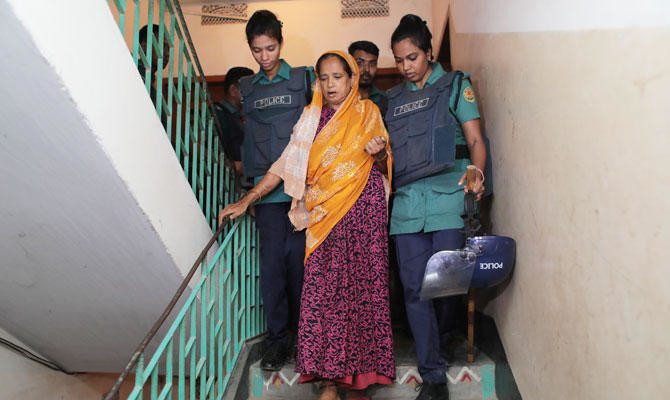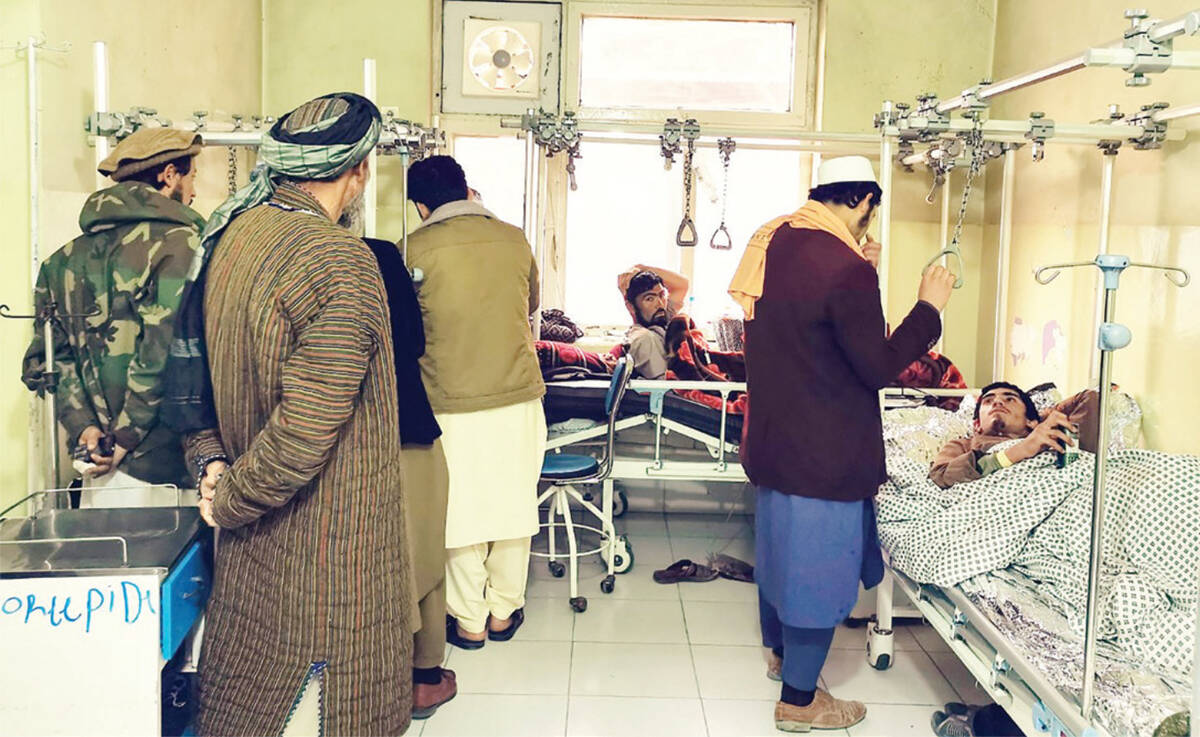DHAKA: Bangladesh police arrested Riazul Islam as he was walking home from his in-laws’ house. At 3:15 a.m., he was shot dead in a sandy field beside a set of railroad tracks north of Dhaka.
Police say he was killed in a gunfight with other drug dealers, and they recovered 20 kg of marijuana from the site. His parents say the officers extorted money from them and then killed him.
“I knew my son was in police custody. All of a sudden my son was dead. I couldn’t believe it. The police took money and they still killed him,” said his mother, Rina Begum.
Bangladesh is the newest frontline in state-backed drug crackdowns in Asia, and Islam is one of more than 200 people shot dead by police in Bangladesh since May, when Prime Minister Sheikh Hasina announced the campaign.
Critics say the crackdown reflects Hasina’s increasingly authoritarian rule ahead of a general election, due by December. That was also shown in its response to recent student demonstrations over road traffic deaths, including the use of rubber bullets and the arrest of a prominent photographer.
Hasina emphasised that the police and intelligence agencies would now tackle the drug problem in the same tough way they had countered violent extremism in recent years.
Such campaigns can be popular with voters as has been shown by President Rodrigo Duterte’s bloody drug war in the Philippines.
Hasina’s office did not respond to questions about whether the drugs campaign was a populist ploy ahead of the election or a means to frighten the opposition.
MOUNTING DEATH TOLL
The bodies appeared rapidly after Hasina’s pronouncement. And, just like the Philippines, the killings appeared to follow a script: suspects died in “gunfights,” typically at night, and weapons and drugs were found nearby.
In more than a third of the 211 killings recorded by Dhaka-based human rights group Odhikar since mid-May, the suspects were arrested before they were killed.
The police are overseen by Home Minister Asaduzzaman Khan, who denied the police were executing suspects.
“Our law enforcement people don’t kill, they don’t execute anyone. It is impossible. If they do so they will be fired at that moment,” he told Reuters. “It is not a lawless country.”
After Islam was arrested, according to the police report, officers took the “top terror” of the neighborhood to the field beside the railroad tracks to draw in and arrest other drug dealers. The other dealers “sensed” the officers’ presence and began firing randomly, and “to save life and government property,” the officers fired back.
“Roni was shot and fell down. He died on the spot,” according to the report, which said two officers were wounded.
Islam’s autopsy report, read to Reuters by a hospital official, noted that a single bullet entered his head near his left ear and exited near his right. Each of the two officers were treated for small areas of tenderness and swelling on one of their hands, according to records at another hospital.
None of the six witnesses in the police report saw Islam die, they told Reuters.
One of the six, handyman Mohammad Bappy, who lives at the edge of the field where Islam was shot, snapped photos of Islam’s dead body. One of the pictures shows blood on the ground beneath Islam’s head.
“There was no gun,” he said. “If there had been a gunfight we would have heard lots of firing from two sides. That didn’t happen.”
Kamal Hossain, the officer in charge of the operation, said drug use leads to crime and arrests don’t work.
“They come out on bail and they do the same thing, selling and using drugs,” he said. “Every drug dealer should be killed. Then drugs can be controlled.”
LITTLE DATA
The UN High Commissioner for Human Rights, US ambassador to Bangladesh and the European Union have all expressed concern about the killings of drug suspects in Bangladesh.
After a government official in the southern city of Teknaf was gunned down by Rapid Action Battalion police in May, the state-funded National Human Rights Commission sent a letter to the ministry in charge of the police to remind it of human rights.
But Hasina pressed on.
“Drugs destroy a country, a nation and a family,” she told parliament in June. “We will continue the drive, no matter who says what.”
Most of the killings took place in May, when there were 129 as the campaign began, but then dropped to 38 in June before picking up to 44 in July.
Drugs have long been a concern for the Bangladesh government, which bans consumption of alcohol by Muslims, who make up the vast majority of the population.
But it’s not clear how much drug use has grown or even how many people use drugs. Asked for figures, Bangladesh’s narcotics deputy intelligence chief said there were none.
“We have no government statistics or non-government statistics about users,” Nazrul Islam Sikder said, adding: “But we guess 7 to 8 million.”
Drug seizures data from the Department of Narcotics Control suggests the drug trade has grown, but much of the increase happened three years ago, long before Hasina launched the crackdown. The data shows a dramatic increase in methamphetamine or “yaba” pill seizures beginning in 2015.
No one believes the official accounts of the killings, said Rashid Alam, a 50-year-old manager of a garment factory near the field where Islam was shot, but he is more concerned about the scourge of drugs use for communities.
“We understand he is a drug dealer and the police shot him,” he said. “That kind of death is okay. Good job, really.”
Critics of Hasina say the crackdown is meant to show voters she is responding to popular concerns and to strike fear in political opponents ahead of the election. According to media reports, some of those killed were activists of the opposition Bangladesh National Party.
For Ashrafuzzaman Zaman, liaison officer of the Hong Kong-based Asian Human Rights Commission, the politics of the drug crackdown are clear.
“You kill 200 people and you make 150 million afraid: today or tomorrow you can also be one of them. That is the message the government is giving to the people,” he said.
Home Minister Khan denied the campaign was a cover to target opposition politicians, and said no drug offender is treated differently from another.
“His identity is only as a criminal,” he said. “Even if he has a link with the ruling party, he will not be spared.”






























